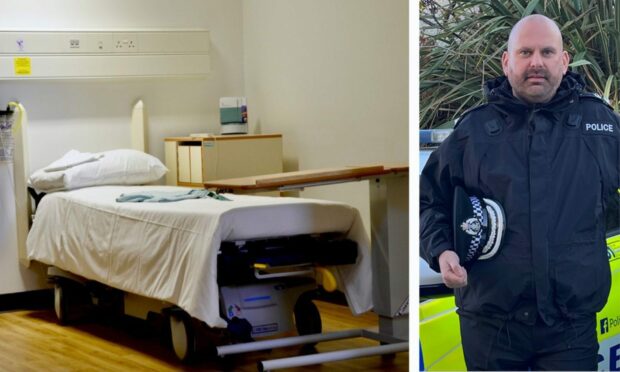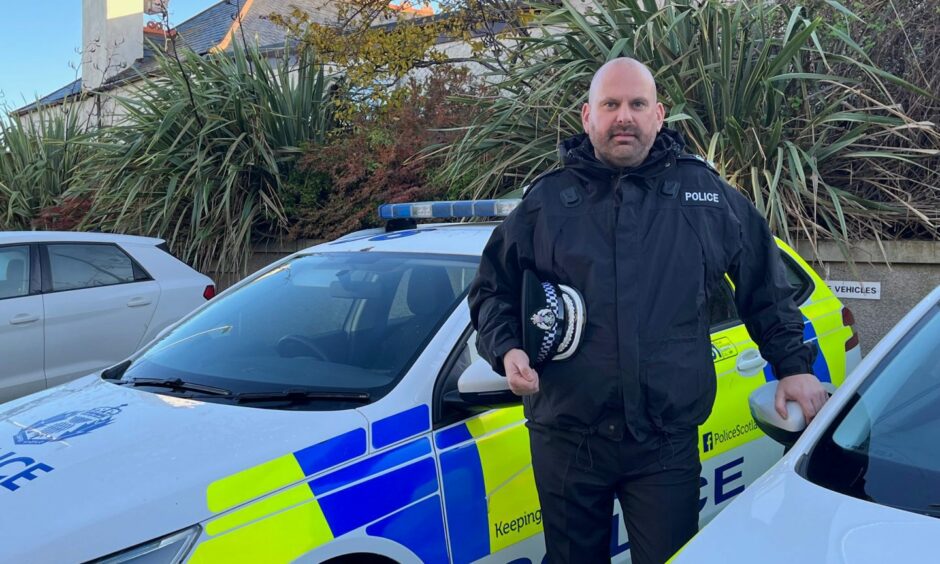Public services “need to work together” to help people through mental health crisis because the police “can’t do it alone”, the north-east’s most senior officer has said.
Chief Superintendent Graeme Mackie, the new commander of Police Scotland’s north-east division, told The Press and Journal that non-crime matters make up 80% of calls to the service.
“Often that involves vulnerability such as individuals in mental health distress and we have to provide a response in the absence of other services,” he said.
“As the service of first and last resort, Police Scotland will always be there for those in crisis.
“But sometimes police officers alone are not the best people to deal with all aspects of our communities’ needs.
“We work well with our partner agencies and we understand the demand that they’re under, in particular health services, but I don’t have hospital beds to give people.
“We unfortunately have prison cells. That’s where people go and often some of them just need additional support beyond the criminal justice system.”
It’s not the first time that police bosses have tried to raise awareness of the mental health pressures that the service is under.
In October last year, Sir Iain Livingstone QPM – Police Scotland’s Chief Constable – spoke out against the “excessive demand” on his officers.
He explained: “We will go and meet an individual who clearly needs some medical assistance or an intervention and are often in distress.
“When we look at that amount of time that our officers are spending engaged with that individual, it means they can’t necessarily go to another incident where a house has been broken into or someone may have been assaulted.”
And in May this year, the now-retired Superintendent Murray Main called on health and wellbeing services to “step forward” and ease the strain on Aberdeen’s police officers.
He called out partner agencies for not doing enough to look after people in their time of crisis and claimed only one in 10 individuals in crises taken to hospital by police were being admitted for help.
“90% of the time, they are released back into our care which can often result in them being locked up,” he said. “In 2022, that is surely not the right answer or response.”
‘We need to work together’
Chief Superintendent Mackie said that “pointing fingers” is not the best solution.
He said finding an answer to the problem should be done “collectively and collaboratively” across all public services.
“We can’t totally burden the criminal justice system with people in a mental health crisis. But I don’t think it’s quite as simple as telling other people to step up.
“It’s a collaborative approach that we all need to take together to try and solve it.
“I’m really reassured by the joined-up approach that we have with local authorities and right across the fire and ambulance services as well as the NHS.
“That’s not to say we’re going to agree with everything but we need to work together.
“Often when we see people in mental health crisis, it’s not as straightforward as somebody else has to step up and deal with them, because it’s not safe.
“Sometimes people in mental health crisis are committing violent crimes and actually, the police are the best people to respond to that initially.
“But it’s what happens to them next. We can’t just do it alone. It has to be done in partnership.
“We need to look at ways of how we can best use our collective resources.”
NHS and government respond
An NHS Grampian spokesperson said 24-hour access to specialist mental health assessment and care is available to people who need it.
“Our mental health teams work closely with Police Scotland colleagues both ‘on the ground’ and at a more strategic level, through the Police Liaison Committee,” she said.
“Across our area, we have rolled out a number of initiatives and pilot services to better support people experiencing extreme distress and acute periods of mental ill health.”
The Scottish Government told The Press and Journal that it’s aware of significant pressures facing mental health services and the impact that has on other services including policing.
A spokeswoman added: “We are working with partners across the health and justice sectors to address these issues and are directly investing in mental health support and services of £290 million in 2023/24.
“This represents an increase from the updated 2022/23 budget of £252 million, following the Emergency Budget Review.
“We will continue to invest in wellbeing and prevention alongside early intervention and improving mental health services.”

